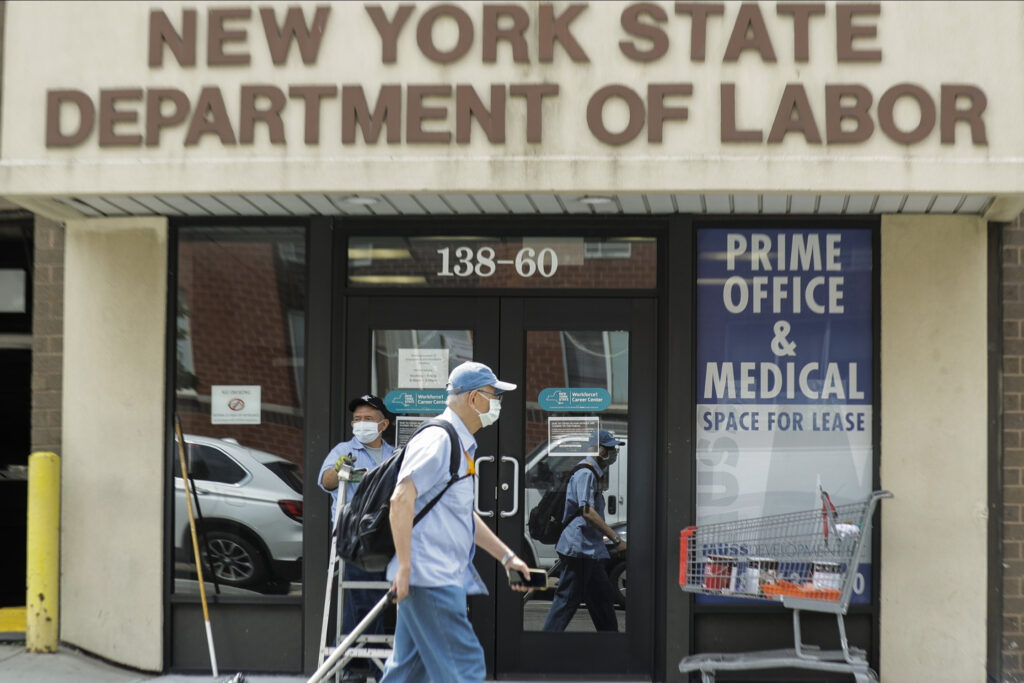Federal unemployment benefits ended over the holiday weekend, raising questions about how the payments’ expiration will affect the job market and whether Congress will renew the benefits.
Congress passed the $300 weekly unemployment payments as a remedy to joblessness during the COVID pandemic when government restrictions forced the layoffs of millions of Americans, but critics have since said the federal benefits are contributing to an economic quandary: elevated unemployment alongside widespread job availability.
In fact, recent U.S. employment data showed more open jobs than workers to fill them. Those employment concerns, along with evidence of widespread fraud in the system, have made the unemployment program a harder sell in Congress.
So far, President Joe Biden has not pushed for a renewal of the federal benefits. While some progressive Democrats have called for legislation making the payments permanent, as of now it seems unlikely.
Now that the benefits have expired, some experts predict that unemployment will decrease.
“The latest job report tell us what many Americans already know: the American economy is being held back by federal unemployment bonuses and expansions that are paying people more to stay home than work,” said Hayden Dublois, an expert at the Foundation for Government Accountability. “States that have ended participation in federal enhanced unemployment programs and bonuses have seen new hires increase, the number of work registrants spike, both unemployment claims and spending decline, and economic activity skyrocket. The American economic recovery has been stagnated by policymakers’ unwillingness to end these bonuses up until this point – but, with enhanced benefits expiring … labor markets will finally have a chance to rebound. It’s long-past time to get America back to work.”
The August jobs report released last week showed nonfarm jobs increased by only 235,000, less than a third of the 720,000 new jobs predicted by Dow Jones economic experts. Experts pointed to this most recent job report, another disappointing one for the year, and put the blame squarely at the feet of the federal unemployment payments.
“The exact size of [Unemployment insurance’s] effect on labor supply and the social benefits of UI are impossible to know (and they likely change according to context), but there is broad consensus that increased UI benefits discourage some workers’ return to employment,” wrote Michael Farren, an expert at the Mercatus Center.
“The concern that the federal expansions to UI reduce the likelihood that workers will return to employment is based on the understanding that unconditional monetary grants to unemployed workers tend to raise their reservation wage – the compensation level necessary for the worker to take a job,” Farren added. “UI programs are typically designed to mitigate this potential effect by replacing only a portion of workers’ preunemployment income (up to some income limit). However, the additional weekly benefits provided by FPUC (as well as the American Rescue Plan’s exemption of $10,200 of UI benefits from federal income tax) means that many low-wage workers saw no decrease in their weekly income (and some even saw an increase).”
Meanwhile, unemployment fraud has become a major source of concern among lawmakers as more and more cases arise of criminals siphoning off funds.
The Department of Justice released details about another case of unemployment fraud Tuesday. Virginia man Johnny Hobbs, along with other coconspirators, allegedly filed false claims for unemployment benefits totaling nearly $800,000.
“Conspirators submitted claims for various individuals who were known to be ineligible to receive pandemic unemployment benefits by making materially false representations,” the Department of Justice said. “Hobbs pleaded guilty last week to one count of conspiracy to defraud the government of the United States and one count of conspiracy to commit mail fraud. He is scheduled to be sentenced on December 10, 2021 and faces a maximum penalty of 30 years in prison.”
Hobbs’ case is just the latest of many instances of fraudulent abuse of the system, something that has been criticized by lawmakers in both parties.
Most recently, Republicans in the U.S. House and Senate sent a letter to the Government Accountability Office calling for an investigation into the level of fraud and how it occurred.
Those members, who estimate the fraud totaled between $89 billion and $400 billion, call it the “greatest theft of American tax dollars in our nation’s history.”
“It is concerning that responsibility for determining how much fraud has occurred lies scattered throughout a web of bureaucracies,” the letter read. “The scattering of responsibilities suggests that Congress will be ill equipped to have adequate information to assess future unemployment insurance responses to large economic shocks; and, at the same time, ensure they are not plagued by gaping security holes that allow fraudsters an open window to use to unlawfully obtained taxpayer funds.”
This article was originally posted on End of federal unemployment raises questions about fraud, joblessness











More Stories
New Jersey committee approves bill that includes unemployment insurance tax credits for small businesses
71% of West Virginia small businesses struggling to find workers
Ohio unemployment improves; group warns of slowdown